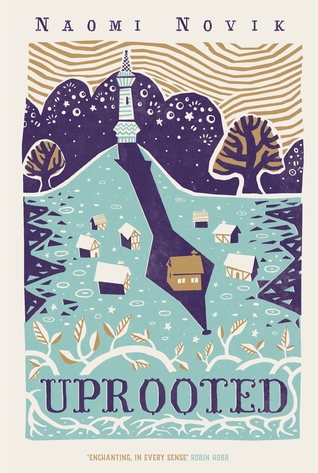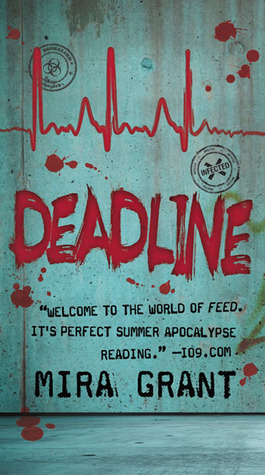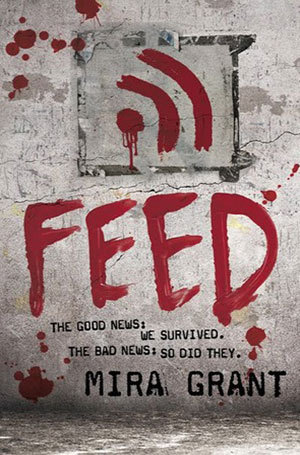Wednesday, 22 April 2015
Blackout by Mira Grant
Fair warning: you really need to read these books in the correct order. Even the slightest description of Blackout's plot will include massive SPOILERS for Feed and Deadline, so if you haven't read those, don't read this review. Read my review of Feed instead, and then buy that book and become addicted. I'll just say that the conclusion will not let you down.
===========
SPOILER ALERT (for Feed and Deadline)
===========
So, Shaun Mason and the surviving journos have survived the second, mosquito-carried rising, and they're out in the sticks of the West Coast, trying to figure out what to do about the CDC, which has turned out to be evil.
Meanwhile, in a sterile white CDC lab somewhere, a young woman wakes up. She's confused: her last memory is of her own death, as she was turning into a zombie. She remembers the sensations of her adopted brother, Shaun, shooting her at the top of the spine to kill her. Pretty soon, she realises that she is a clone of Georgia Mason, with implanted memories. And there's something a little off about the CDC doctor who soon presents himself to oversee her recuperation and examinations...
Ahem. George is back! Woohoo! (And suddenly the first person narration of the first book falls into place and makes perfect sense).
Better yet, as this is not the middle volume of a trilogy, the plot moves briskly on, with discoveries, conspiracies, chases, zombies, battles and good-natured banter aplenty. All the things that made Feed great are back in play. (Deadline isn't a bad book, but it suffers from not really having a decent ending, and from middle-book-syndrome). Blackout neatly ties everything together - it seems very likely that the entire trilogy was planned out in quite a lot of detail before the first book was written.
I never thought I'd actually love a series of zombie novels. There are a few zombie movies I vaguely enjoy, but I'm hardly a fan of the genre. The Newsflesh series is superbly entertaining and great fun, even for people who are not fanatical about zombies to begin with. I'd love for it to be turned into a TV series.
If you have read the firs two books, read Blackout, too. If you haven't read the first two books, D'Oh! Why did you read this review?!?
Rating: 5/5
Monday, 20 April 2015
Uprooted by Naomi Novik
Once every ten years, The Dragon picks out a seventeen-year-old girl from one of the surrounding villages. The girl has to stay with him in his tower, unseen for ten years, and she is only released when he picks her replacement.
The Wood, meanwhile, is a forest fuelled by a monstrous will, fighting a long and brutal battle against the people. The Dragon is the bastion that keeps the Wood at bay and protects Poland from its malevolent influence and infectious monstrous creatures.
So starts Uprooted, a novel seeped in archetypal fairy tale aesthetic. The atmosphere of the setting is quite rich while the first person narration is more down to earth. Agnieszka does not tell her stories in melodramatic tones, but in the voice of a girl who is a bit of a tomboy, permanently messy, and perfectly disinterested in her appearance or girlish behaviour.
So far, so good. But Uprooted is not just a setting; it is a story. It's a story of apprenticeship, of magic and of courtly intrigue. Most of all, it is a story of a young woman and a very powerful wizard.
That's where I quickly find myself suspecting that I am not the target audience. The dynamic between The Dragon and Agnieszka is not one I enjoyed reading - in fact, I rather disliked The Dragon even though I suspect the reader isn't supposed to. On the other hand, as soon as Agnieszka was having her own adventures, I was totally engrossed. Fortunately for me, Agnieszka does have plenty of exciting adventures, so there was much for me to enjoy.
I suspect that not all readers will share my dislike of The Dragon. Even those who do will find the world of the story and the adventures delightful. I'd go as far as saying Uprooted is slightly superior to the Temeraire novels I've read so far - and for readers who feel differently about The Dragon, it may be an absolute favourite.
Rating: 3.5/5
Book Trailer
Thursday, 16 April 2015
Next Cardiff Speculative Fiction Book Club read: Ringworld!
Nikki and I had a good chat about Angela Carter's Fairy Tales on Sunday - but we missed everyone else! Kudos to Nikki for cutting short a trip to Yorkshire just to attend the Book Club meeting. I'm hopeful a few more people will be able to come along next time.
- The next book is Ringworld by Larry Niven.
- The next meeting will be on Sunday 10th May, at 3pm, in A Shot In The Dark on City Road in Cardiff. (I know at least one person is not a native to Cardiff - please get in touch if you'd like directions!)
Hope to see you then!
Useful Links
- Book Club (sign up) page
- Book Club Meeting as event on Facebook
- Book Club Meeting as event on Goodreads
Sunday, 12 April 2015
Deadline by Mira Grant
If you haven't read Feed, do not read this review - I'm afraid there are some massive spoilers ahead.
Shaun Mason has not gotten over the events in Feed. His sister George, who died, lives on in his head. He can hear her talk to him and he responds aloud. He isn't scared of the fact that he has gone insane - he is much more scared that he might become sane again and lose his sister a second time.
Despite Shaun's mental state, the After the End Times, the news empire they created together, continues to flourish in the hands of his team. Then, one day, a researcher stumbles into their office. A researcher who, it is reported, has just died. She brings with her a tale of conspiracy and cover ups, of possible murders at the CDC, and a terrible secret about the nature of the zombie infections and the reservoir conditions. Seeing a chance to uncover the grand conspiracy that killed his sister, Shaun gets his team together and pursues the story - barely escaping from one assassination attempt to another.
Deadline is not quite as compulsive reading as Feed. Feed was about young people trying to create their place in a post-zombie world and conquer the media. In Deadline, that conquest has succeeded (albeit at a terrible price), and we follow a slightly more dysfunctional gang as they try to figure out how to pursue a story on their own. In Feed, they followed a presidential campaign, tagging along one particular senator - take that drive away and hand the reigns to a schizophrenic Shaun Mason, and there's a bit less direction.
It's still very readable and good zombie fun with real thrills, but the book has a bit less sparkle than the first one, and it reads much more like a "middle novel". The first had an ending. This one does not have a real ending, but sets up a final novel in a trilogy. It's not a standalone novel, and you notice.
A good read nonetheless, and I'm looking forward to the third volume.
Rating: 4/5
Monday, 6 April 2015
Making Hugo Lemonade?
After the panel, I has an idea for something that could be done right now, for 2015.
Why not create and issue a second set of (one-off) awards this year?
Here's how it could work:
- The Organisers of the Hugos and/or Worldcon would have to be willing to offer logistical support
- It should be easy to identify the works and authors that were displaced by the puppies-list. Simply subtract all puppies-listed ones and see what's topping the nominations counts.
- List an equal number of works to the Hugos list for each category that issues the second set of awards.
- Use the same voting procedures and the same electorate as the Hugos.
- This is where Hugo organisers would have to come in: They'd have to distribute both lists in the same packet, alongside an explanation for why there are two sets of awards this year.
- Ideally, there should be a packet for these awards, too.
- Use crowdfunding to fund trophies and any prize money (if applicable) for this year. I'd happily chip in.
- At the next Worldcon, schedule a prize giving ceremony for the second set of awards. (Personally, I'd make it a joint ceremony with the Hugos)
And I'm sure there is some debate to be had whether such awards should cover all categories or only those which were completely rumbled by the puppies lists, but all that is detail that can probably be worked out. (From discussions tonight, it seems that there are some perfectly deserving novels on the Hugo shortlist, but the categories for short fiction and editors have allegedly been harmed a lot by the puppies' efforts this year.)
Here's why I think it would be a phenomenally useful thing to do:
- It would shine a spotlight on works that were a) deserving of attention and b) displaced by the effort of the puppies.
- Lots or people were debating about the long-term future of the Hugos. But any improvement to the Hugos themselves will take time to take effect...
- If fandom manages to react in the same year as people try to attack / game the system, then this demonstrates a resilience and an ability to respond (even before any tweaks to the Hugos system can be discussed and decided) that could, in my opinion, discourage repeat attacks in future
- It would set a precedent. Should the Hugos come under attack again in future, future organisers would not be caught unawares / have this tool in their arsenal.
Saturday, 4 April 2015
Hugo nominations kerfuffle
So, am I understanding the Hugo controversy correctly? A bigot & some paranoid conspiracy theorists dislike literary, character-centric fiction and perceived efforts to make SF/F books more ethnically and sexually diverse, so they decided to block nominate an agreed list of works to reward books they think are fun (action books with no more than token diversity)? A celebration of populism as the highest quality? Basically, they're Murdochifying / Fox Newsing a literary award?
And this year, they succeeded at defining the shortlist?
How odd. If pure popularity is their highest literary virtue, why don't they sing the praises of the Goodreads Choice Awards?
Oh well. I guess that I'll take less note of any "Hugo nominated" blurbs mentioned on book covers when buying books in future.
That said, it looks like a list which does include works that decent folk have been enthusiastically praising, too, so not really a complete disaster. (John Scalzi's summary is the best I've seen so far), and few of the nominated authors would want to be on a list picked by a-holes. I feel quite sorry for this year's nominees - this kerfuffle is probably tainting what should have been a pure celebration for them.
I still expect that the winning works will be deserving ones...
Wednesday, 1 April 2015
Feed by Mira Grant
So I figured it's time to read up on Dysprosium Guest of Honour Seanan McGuire / Mira Grant. My choice of novels is a little restricted - for some mysterious reasons, most of her work does not exist on Kindle in the UK. Feed, fortunately, does.
I have not read many zombie apocalypse novels (one and a half, to be precise), but I have watched a few films. Feed is unlike any of them. It's not so much a zombie apocalypse story as a novel with a post-zombie-apocalypse setting. It does not, however, read anything like a postapocalyptic novel.
Let's start again:
The zombie apocalypse has happened. People (and large animals) who die now immediately turn into flesh-eating zombies. The long-dead, however, do not rise from their graves. This was a massive catastrophe for mankind, about twenty years ago. By the time of this story, the world has adjusted. There are many safety precautions, frequent checks, and areas get a safety rating that determines who may or may not enter, and how armed any person entering those zones has to be. All in all, this is a world where everyday lives have re-established themselves. Civilization has survived the apocalypse. So have video games, the internet, TV, the government and the political process.
Which brings me neatly to our heroes - a brother-sister duo of bloggers. They're blogging for a larger conglomerate at the start, but hope to start their own independent media outlet. In this world, the most thriving and proactive journalism has long moved from mainstream media to blogs. Then, they are selected to accompany a Republican senator's presidential campaign. Jackpot!
Feed grabs you right from the start and keeps you engaged all the way through. The characters are interesting, their adventures get progressively more exciting and by the end it's a tense page-turner that might rob you off sleep and give you bad dreams. All the while, there's some banter and humour and a real buzz. These are young people, excited to make their mark on the world, and the excitement catches. It's fun and thrilling and at times even scary - everything a zombie story should be.
The book reminded me of the novels of Cory Doctorow. Like in Doctorow's novels, there is a dollop of wish-fulfilment literature about some aspects (I can imagine bloggers becoming mainstream sources of info, but I can't imagine the 'fictionals' being a pillar of that success), and the benevolent super-senator character could just as easily have escaped from the pages of Makers. Or, having just checked the respective publication dates, the bloggers and benevolent funder in Makers might just as well have escaped from the pages of Feed and influenced Doctorow - apparently, Feed was published a few years earlier! On the other hand, Feed is not quite as infodumpy, and a lot more interested in keeping you thrilled and entertained with zombies than in educating readers and entertaining you through techy awe.
Aside from the wish fulfilment angle, the only flaws were inconsistencies. The biggest of those are the excerpts from the blogs. Unfortunately, these don't match what the bloggers purport to be doing. They read like today's blogs, not like they would be anyone's preferred source of news, information and entertainment. This is meant to be a world where mainstream media are being displaced by bloggers producing more ethical, honest, forthright and compelling content - but the samples given in the text read too much like amateur blogs today, ranty and preachy and not all that factual. Instead of building up buy-in to this world, they eroded it a little for me. The second notable inconsistency was the politics of the Republican senator. He does not come across like a Republican of any sort. I kept wondering when he'd do or say something Republican-y, but he never does.
Those grumbles aside, it is a superbly entertaining, clever and original novel.
Rating: 4.5/5
Book Club update: Angela Carter's Fairy Tales
I'm not quite sure whether I'll be able to finish reading the entire Book of Fairy Tales by the time of the next book club meeting. It may also be a bit tricky to chat about an entire book full of tales in one go.
So I thought things it might be good if everyone who's planning to come along to the next meeting nominates one or two of the tales for discussion. All of us can then make sure to read those specific ones, even if we don't all finish the entire book.
(Anyone who hasn't bought / borrowed the book yet could search for the specific tales - some are likely to exist elsewhere for free on the web)
Here's one I really enjoyed:
Vasilisa The Priest's Daughter
(I'm still only about 90 pages into the book & I still intend to read it all, so I'll probably nominate a second story later on...)
Also, re: Terry Pratchett novel for August - Monstrous Productions are about to announce their next play, which will be performed this autumn. It'll be a Sam Vimes one. How about we pick whichever play they announce and then go to see it when they perform it?
Addendum: for July, the nominated book will be One Night in Sixes by Arianne "Tex" Thompson.




